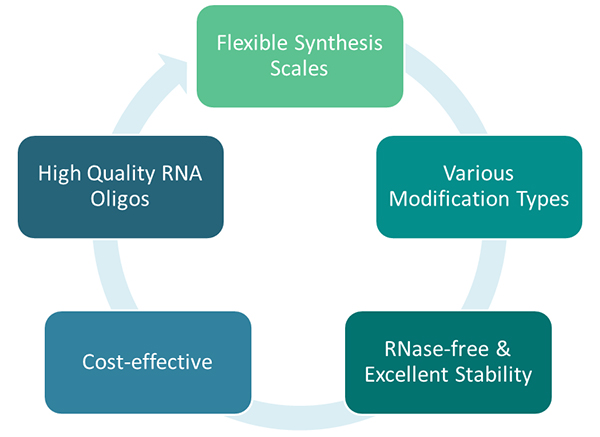The world of biotechnology is constantly evolving, and with it, the tools we use to unlock the secrets of life. One such tool that has captured the attention of scientists and researchers worldwide is In Vitro Transcribed (IVT) RNA. It offers unprecedented efficiency, stability, and customization compared to traditional mRNA synthesis. With advancements such as CleanCap Reagent AG for efficient capping and Hi-T7 RNA polymerase for optimized temperature conditions, IVT RNA is poised to revolutionize various fields, particularly in biomedicine.
Vaccine Development: The Frontline against Disease
mRNA Vaccines | A Marriage of Speed and Efficiency
The advent of mRNA vaccines has transformed our approach to combating infectious diseases, providing rapid and effective solutions. By utilizing IVT technology to synthesize mRNA that encodes antigen proteins, these vaccines stimulate the immune system to mount a response against specific pathogens. This flexibility allowed mRNA vaccines to quickly address emerging threats during the COVID-19 pandemic, making them crucial weapons in the global fight against the virus.
circRNA Vaccines | A Leap in Stability
As the next evolution in vaccine technology, circular RNA (circRNA) vaccines offer superior stability and sustained expression. IVT RNA plays a crucial role in circRNA synthesis, facilitating breakthroughs in vaccine development for diseases like melanoma. These vaccines, currently in preclinical testing, hold promise for future applications.
Gene and Cell Therapy: The Cornerstone of Precision Medicine
Gene Editing | The Precise Tool for Healing
In gene editing, IVT RNA is indispensable, serving as the core component of revolutionary tools like CRISPR-Cas9. By designing specific RNA sequences, it directs the Cas9 enzyme to precise genetic targets, enabling the addition, deletion, or modification of DNA sequences. This technology's high specificity and efficiency make it a powerful tool for correcting genetic mutations and advancing precision medicine.
Induced Pluripotent Stem Cells | Bridging Cellular Reprogramming
IVT RNA is also pivotal in generating induced pluripotent stem cells (iPSCs). By introducing synthesized RNA into cells, key transcription factors are expressed, reprogramming somatic cells into iPSCs with multi-lineage differentiation potential. This method not only enhances transfection efficiency but also minimizes the use of viral vectors, offering a safer and more controlled approach to regenerative medicine and disease modeling.
Cellular Therapy | Empowering Antitumor Immunity
In cell therapy, IVT RNA significantly boosts the anti-tumor capabilities of immune cells like CAR-T cells. By transducing T cells with IVT RNA encoding specific antigen receptors, these cells temporarily express CAR structures, empowering them to target specific tumor antigens. Additionally, IVT RNA is instrumental in next-generation cancer immunotherapies, enabling the synthesis of RNA molecules that activate or inhibit immune pathways for precise cancer treatment. This RNA-based approach enhances treatment safety and targeting while allowing for personalized therapy based on patient-specific needs.
Diagnostics: Enhancing Disease Detection
IVT RNA is revolutionizing diagnostic technologies by serving as an RNA amplification template for rapid disease detection and monitoring. The high-efficiency synthesis of IVT RNA enables the amplification of specific RNA sequences, improving diagnostic sensitivity and specificity. This is particularly crucial in viral testing, where IVT RNA technology significantly reduces false-positive rates, providing reliable support for accurate diagnosis and early treatment, thus offering patients a better chance at recovery.
Synbio Technologies
RNA Synthesis Platform
With decades of experience in RNA research and development, Synbio Technologies provides tailored solutions to overcome these challenges. Our scientists employ both chemical synthesis and IVT mRNA synthesis strategies to deliver exceptional results. We offer a range of services, including RNA oligo synthesis with various modifications and delivery options, functional siRNA synthesis, miRNA synthesis, lncRNA synthesis and in vitro transcription synthesis.

References
【1】Fang, Enyue, et al. "Advances in COVID-19 mRNA vaccine development." Signal transduction and targeted therapy 7.1 (2022): 94.
【2】Parayath, N. N., et al. "In vitro-transcribed antigen receptor mRNA nanocarriers for transient expression in circulating T cells in vivo." Nature communications 11.1 (2020): 6080.
 DNA Synthesis
DNA Synthesis Vector Selection
Vector Selection Molecular Biology
Molecular Biology Oligo Synthesis
Oligo Synthesis RNA Synthesis
RNA Synthesis Variant Libraries
Variant Libraries Genome KO Library
Genome KO Library Oligo Pools
Oligo Pools Virus Packaging
Virus Packaging Gene Editing
Gene Editing Protein Expression
Protein Expression Antibody Services
Antibody Services Peptide Services
Peptide Services DNA Data Storage
DNA Data Storage Standard Oligo
Standard Oligo Standard Genome KO Libraries
Standard Genome KO Libraries Standard Genome Editing Plasmid
Standard Genome Editing Plasmid ProXpress
ProXpress Protein Products
Protein Products
























